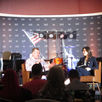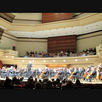Renowned pianist Wael Farouk joins New Philharmonic to perform Brahms Concertos
- Mar 15, 2024
- 5 min read
Internationally acclaimed pianist Wael Farouk joins Maestro Muspratt and New Philharmonic to perform Brahms’ Piano Concertos Nos. 1 and 2 at 7:30 p.m. Sat., April 13, and 3 p.m. Sun., April 14 at the MAC.
Photo: Wael Farouk. Photo courtesy of the McAninch Arts Center
“It brings some comfort at least that there is a pattern in one’s life that despite challenges … you know that there is a light at the end of the tunnel. You know that challenges make you stronger, they make you learn about yourself,” said world-renowned pianist Wael Farouk in his interview to Warwick Fairfax from Beyond The Crucible.
Maestro Kirk Muspratt and New Philharmonic are happy to welcome back Egyptian-American pianist Wael Farouk. New Philharmonic and Farouk will perform Brahms’ Piano Concertos Nos. 1 and 2 at 7:30 p.m. on Saturday, April 13, and 3 p.m. Sunday, April 14 at the McAninch Arts Center in Glen Ellyn.
A free MAC Chat will precede each concert one hour prior to concert time.
It will be his fourth time performing with the New Philharmonic. Farouk was last seen at the MAC in 2021 performing Rachmaninoff’s Piano Concerto No. 1 in F-sharp minor, Concerto No. 2 in C minor and Concerto No. 3 in D minor — all in a single program. Such an intense program is not unusual for this musician, who is used to achieving his goals despite difficulties and obstacles.
It is known that Farouk will be playing the entire program three times a day before the New Philharmonic concert. As a result, New Philharmonic audiences will once again be amazed by Farouk’s performance, whose talent is well-known and appreciated not only by those who have already heard him perform at the MAC, but also by the entire international community of classical music lovers.
What amazes his audience is his incredible strength and perseverance.
“For example, my hands were very, very unusually small,” said Farouk in his interview with Fairfax describing his childhood. “I have very short finger ligaments, till this day, I am unable to make a fist. It’s challenging for me to do some buttons and to open jars and stuff like that. It took me several years to be able to put on my own contact lenses because before that, due to my eye condition, I used to wear those, what do you call them? Coke bottle bottoms. Very, very, very thick glasses…”
Besides being born with short finger ligaments, Farouk was born with an eye condition where his inner lenses are completely detached from their holding case and are tilted. The ligaments holding them are practically torn, from his own words, so they are basically not there. Because of that, his doctor told him he couldn’t exercise.
But he chose to play piano, despite all the obstacles. And he does. In his early childhood he exercised his fingers on a toy piano, and it led to his deep love for music and a desire to seriously learn to play that instrument. Farouk accomplished something many people thought was impossible. Right before he turned five, he started playing at churches. By the age of six, he was playing regularly for the weekly services in the main Coptic cathedral in his town. When his dad took him to The Conservatory, the Dean of The Conservatory told his dad that there was not even a 1% chance that his son would be a pianist.
He was wrong. But Farouk was given a chance. And he proved he could do it.
Farouk has performed on five continents in such venues as the White Hall in St. Petersburg, Schumann’s house in Leipzig, and Weill Recital Hall at Carnegie Hall in New York, garnering international acclaim.
Dr. Farouk received his Bachelor of Music degree at the Cairo Conservatory, then came to the United States on a Fulbright Fellowship to study at the Catholic University of America. After receiving a Master of Music degree from Converse College, he continued his studies at the Manhattan School of Music and the Chicago College of Performing Arts. Later, he received a DMA degree from Rutgers University.
Farouk commands a vast repertoire of more than 70 concertos and 60 solo programs, spanning from Scarlatti to Bolcom and including the complete piano works of J.S. Bach, Beethoven, Brahms, Chopin, and Rachmaninoff, 10 solo recitals of Franz Liszt’s music, as well as the complete sonatas of Prokofiev, Scriabin, and Schubert. He has appeared as a soloist with such orchestras as the North Czech Philharmonic Orchestra, the Saint-Etienne National Orchestra, the Academy of the Arts Orchestra, the Manhattan Symphony, and the Cairo Symphony Orchestra.
Farouk has served as Director of the Keyboard Studies Program of Wisconsin's Carthage College and Piano Faculty at Chicago's Roosevelt University. Using virtual technology, he has instructed students as far away as China, Nigeria, Ukraine, and Egypt. Farouk is now on the piano faculty at the Manhattan School of Music in New York, his alma mater.
In the spring of 2021, Farouk was approached by Dr. Nash Naam, the President of the American Association of Hand Surgery, after he had read an article in the Chicago Tribune about Farouk’s historic performance of Rachmaninoff’s piano concerti with the New Philharmonic. As a result, in 2022 Farouk delivered the lecture "My Perfect Hands" to members of the American Association of Hand Surgery, which helped hand surgeons understand more about his condition and work better with children with unusual hand conditions and with their parents.
His talent will light up the Chicago area once more on April 13 and April 14. Under the baton of Maestro Muspratt, Farouk along with the New Philharmonic will impress the audience with two masterpieces by famous German composer Johannes Brahms. Piano Concerto No. 1 in D minor, Op. 15, was completed in 1858 and premiered in 1859. It began as a symphony and became a sonata for two pianos, but soon Brahms realized that he conceived it as a much larger work, particularly as a piano concerto.
This emotional and expressive composition will be followed by another incredibly deep and passionate masterpiece – Piano Concerto No. 2 in B-flat major, Op. 83. It debuted 22 years after Concerto No. 1. Concerto No. 2 is one of the most difficult piano concertos to perform.
“The soloist performs more as a partner with the orchestra than in some concerti, playing passages of octaves or sixths, huge chords, and complex rhythms along with the orchestra,” according to the website of Redwood Symphony.
“Knowing your limitation is a blessing, is often more important than knowing what you’re able to do,” told Farouk to Fairfax. By performing Brahms on his favorite instrument, Farouk will once again share with us his inspirational story of strength, perseverance, and love for music.
For tickets visit https://www.atthemac.org/events/brahms/ or call 630-942-4000. Tickets are $55. The McAninch Box Office is open Tuesday – Saturday, 12 p.m. – 6 p.m. and two hours prior to performance.
Natalia Dagenhart


























Comments